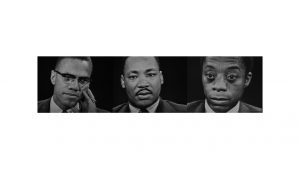 Politics are an inescapable aspect of our lives, now more than ever. It would be rather difficult not to have an opinion on any number of prevailing issues. Therefore, when celebrities weigh in on social and political topics, I don’t begrudge them their opinion. The collective public response is often an admonishment to “stay out of politics” or “stick to acting,” etc., but do art and politics mix? I Am Not Your Negro answers yes, and quite beautifully.
Politics are an inescapable aspect of our lives, now more than ever. It would be rather difficult not to have an opinion on any number of prevailing issues. Therefore, when celebrities weigh in on social and political topics, I don’t begrudge them their opinion. The collective public response is often an admonishment to “stay out of politics” or “stick to acting,” etc., but do art and politics mix? I Am Not Your Negro answers yes, and quite beautifully.
James Baldwin – for the uninitiated – was a 20th-century luminary noted for his writings and political activism. He rose to prominence in the 1950’s, espousing a political consciousness that captivated the White intelligentsia and paragons of Black history alike. Baldwin did not separate artistry from politics; they were part and parcel of his very being. I Am Not Your Negro begins with Samuel L. Jackson’s resonant baritone, his familiar voice a befitting conduit for Baldwin’s poignant musings. Awash in color, the film has an uncommon beauty not typically found in documentaries. Its rich aesthetic is a provocative contradiction of the brutality it depicted, as the film highlights the abject cruelty of a not-so-bygone era.
 Baldwin’s consciousness was awakened on foreign soil, as he observed the violence visited upon Black Americans from afar while living in France. Disenchanted with a racist America, he’d long since fled to Paris where he found the same artistic refuge as fellow wayward expatriates Josephine Baker and Nina Simone. While he missed nothing about America, he longed for his mother and siblings, and he missed the soul of Harlem. Ultimately it was a photo that brought Baldwin home, the image of a young Black woman being heckled mercilessly as she integrated a school in North Carolina. We can see why the photo struck Baldwin so powerfully: the girl’s face is pained but stoic, her slight frame surrounded by a sea of faces seething with rage and hate. This theme is the foundation of I Am Not Your Negro, an unabashed revelation that hypocrisy is as American as apple pie.
Baldwin’s consciousness was awakened on foreign soil, as he observed the violence visited upon Black Americans from afar while living in France. Disenchanted with a racist America, he’d long since fled to Paris where he found the same artistic refuge as fellow wayward expatriates Josephine Baker and Nina Simone. While he missed nothing about America, he longed for his mother and siblings, and he missed the soul of Harlem. Ultimately it was a photo that brought Baldwin home, the image of a young Black woman being heckled mercilessly as she integrated a school in North Carolina. We can see why the photo struck Baldwin so powerfully: the girl’s face is pained but stoic, her slight frame surrounded by a sea of faces seething with rage and hate. This theme is the foundation of I Am Not Your Negro, an unabashed revelation that hypocrisy is as American as apple pie.
The film is loosely intended to carry forth Baldwin’s untold artistic vision intertwining the stories of Malcolm X, Martin Luther King, and Medger Evers. The film dances around these three narratives in a disjointed fashion, splicing current events throughout the film. Director Raoul Peck brilliantly draws a parallel between the police brutality of the Jim Crow era and the impetus of the Black Lives Matter Movement today. Baldwin was Black and he was proud, but he was accessible to White America because he did not hate them. He explored the way Blackness had to be packaged to make it palatable, and Peck masterfully uses cinematic examples to underscore Baldwin’s profound speech. Hollywood is rife with the stereotyping and marginalization of which Baldwin spoke, and the film was comprehensive in its discussion of film and media’s effect on the collective psyche of Black and White Americans alike.
Art inspires, but at times it can make us uncomfortable. Let me state the obvious that this film is not for everyone, and the title alone is enough to keep some viewers away. It is not a call to arms, but rather an attempt to rouse the consciousness and to demand that White America take an unflinching look in the mirror. Powerful and provocative, I Am Not Your Negro is one of the better documentaries I’ve seen.
